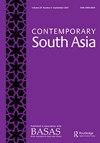Dynastic dilemma in South Asia: influence, networks and shamefacedness
IF 0.5
3区 社会学
Q3 AREA STUDIES
引用次数: 0
Abstract
ABSTRACT This article contributes to the growing literature on political dynasticism in contemporary South Asia and shifts the focus from the much-debated national level dynasties to the usually ignored dynasties operating at subnational and regional levels. Analytically, it investigates the ‘moment’ of succession, conceptualised as the period when new heirs are actively enrolled in a dynastic formation. Such moments of succession can be perilous moments for dynastic formations, potentially disrupting its routine functioning style. And yet, these moments allow a clear identification and opportunity for analysis of the specific dilemma that all political dynasties have to negotiate. This dilemma can be described as follows: how to reconcile (1) the need to project emerging dynastic heirs as extraordinary beings embodying the special qualities of the original dynast, with (2) the equally pressing need to downplay inherited dynastic privilege – conceptualised here using Louis Dumont’s idea of ‘shamefacedness’ – often portrayed as an illegitimate source of power and influence in postcolonial South Asia. A successful succession, as this article argues, relies on the ability to negotiate this dilemma. To demonstrate this negotiation in practice, the article analyses two cases of dynastic succession: Abhishek Banerjee in West Bengal, India and Serniabat Sadiq Abdullah in Barishal, Bangladesh.南亚王朝的困境:影响、网络和羞耻
本文对当代南亚日益增多的政治王朝主义文献做出了贡献,并将焦点从备受争议的国家层面的王朝转移到通常被忽视的次国家和地区层面的王朝。分析上,它调查了继承的“时刻”,将其概念化为新继承人积极参与王朝形成的时期。这样的继承时刻对王朝构成来说可能是危险的时刻,可能会破坏其常规的运作方式。然而,这些时刻为分析所有政治王朝必须谈判的特定困境提供了清晰的认识和机会。这种困境可以描述如下:如何调和(1)需要将新兴的王朝继承人描绘成体现原始王朝特殊品质的非凡人物,(2)同样迫切需要淡化继承下来的王朝特权——这里用路易斯·杜蒙的“羞耻”概念来定义——通常被描述为后殖民时期南亚权力和影响力的非法来源。正如本文所论述的那样,成功的继任依赖于解决这种困境的能力。为了在实践中展示这种谈判,本文分析了两个王朝继承的案例:印度西孟加拉邦的Abhishek Banerjee和孟加拉国巴里沙尔的Serniabat Sadiq Abdullah。
本文章由计算机程序翻译,如有差异,请以英文原文为准。
求助全文
约1分钟内获得全文
求助全文
来源期刊

Contemporary South Asia
AREA STUDIES-
CiteScore
2.10
自引率
0.00%
发文量
82
期刊介绍:
The countries of South Asia - Bangladesh, Bhutan, India, Maldives, Nepal, Pakistan and Sri Lanka - are internally diverse and part of global flows of people, goods and ideas. Contemporary South Asia seeks to address the issues of the region by presenting research and analysis which is both cross-regional and multi-disciplinary. The journal encourages the development of new perspectives on the study of South Asia from across the arts and social sciences disciplines. We also welcome contributions to pan-regional and inter-disciplinary analysis. Our aim is to create a vibrant research space to explore the multidimensional issues of concern to scholars working on South Asia and South Asian diasporas in the postcolonial era.
 求助内容:
求助内容: 应助结果提醒方式:
应助结果提醒方式:


